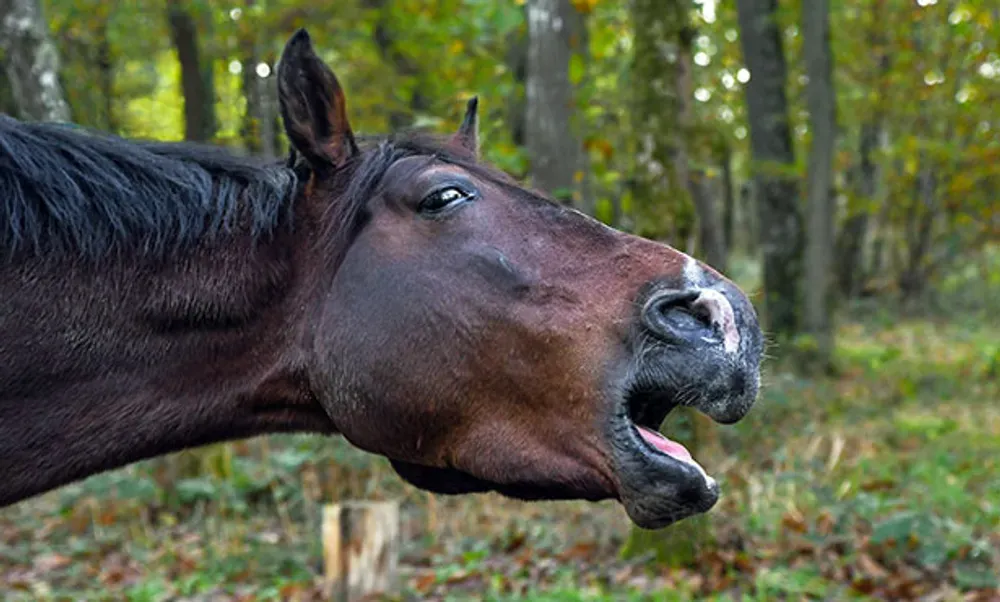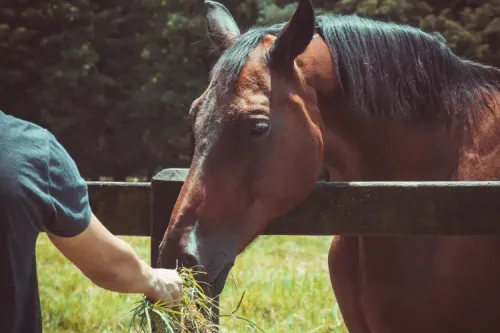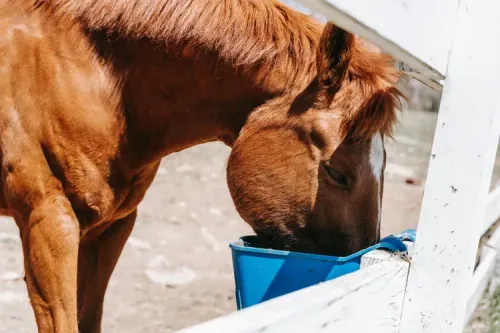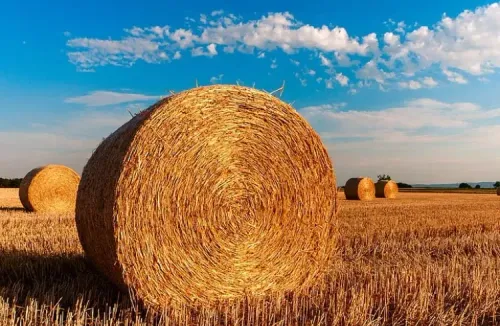
Table of Contents
Introduction
Whether competing in equestrian sports or serving as hacks/companions, the well-being of horses is of utmost importance to their owners. One health concern that affects horses is Heaves. So what is Heaves?
Heaves, scientifically referred to as Recurrent Airway Obstruction (RAO), is a chronic, and often progressive, respiratory condition that primarily affects mature horses. Heaves cause the inflammation and constriction of a horse's airways, making breathing difficult. It can be likened to humans with asthma.
Causes of Heaves
Understanding the root causes of Heaves is crucial for both prevention and management. Prolonged exposure to allergens in the horse's environment is the primary contributor. The primary culprits behind Heaves include dust, mould spores, pollen, and other inhaled irritants commonly found in barns and stables. Good stable management will generally prevent or control Heaves. Some horses are more prone to developing this condition while others are more resistant to developing RAO.
Environmental Controls to Help Prevent Horses from Developing Heaves
There are 5 essentials for horse care and these must be adhered to.
- Maintain stable ventilation: Ensuring that stables have proper ventilation is crucial for reducing the concentration of respiratory irritants. Adequate airflow helps disperse dust and ammonia, making the stable environment more favourable for all horses.
- Reducing dust exposure: Minimising dust in the horse's living environment is vital. This can be achieved by using wood chips instead of straw bedding. Hay must be dust-free hay and this is achieved through soaking or streaming. When stables are mucked out it is advisable to turn out the horses.

Article Suggestion
How To Soak Hay for Horses- Avoiding mould exposure: High-quality, mould-free bedding and hay significantly reduce allergen exposure. Never use mouldy straw or hay. Straw should have no odour and be easily shaken up or else it has been water-contaminated and is mouldy. Hay must not smell musty.
- Reduce ammonia levels: This means stables must be daily cleaned to remove urine-soaked bedding and dung. Your manure heap must be well away from the stable areas.
- Ensuring turnout: Unless a horse has Summer Pasture-Associated Heaves. they must have regular access to turnout in paddocks or pastures. Turnout allows them to breathe fresh air, engage in physical activity, and reduce their exposure to stable-related allergens.
Horses can develop Heaves when out on Summer pasture!
This generally affects susceptible horses in hot humid conditions and is called Summer Pasture-Associated RAO. Some horses will be susceptible to this condition without there being hot humid conditions.
Affected horses need to be kept off pasture at the times of the year when they start coughing.
Spotting the Signs of Heaves
Observing the early signs of Heaves is crucial for timely intervention. It is the owners' responsibility to be vigilant and spot the emerging signs and in many cases, the horse will develop a slight wheeze when RAO is emerging. This is the time to act promptly and isolate the environmental irritant.
A horse with established Heaves will have any of the following symptoms.
- Coughing: Horses with Heaves often exhibit persistent chronic coughing, especially after exercise or when exposed to dusty environments.
- Nasal Discharge: Increased nasal discharge can be a sign of respiratory distress.
- Laboured Breathing: Horses may exhibit rapid or laboured breathing, even at rest.
- Exercise Intolerance: Reduced stamina during physical activities may be noticeable.
- Flared Nostrils: Horses may flare their nostrils to facilitate breathing.
Heaves causes a Heave line!
Badly affected horses will suffer weight loss and develop a Heave Line along their lower abdomen. The horse's Heave Line is the result of the extra effort needed to expel air from its lungs.
Severity of Heaves
Heaves can range from mild to severe, with different horses exhibiting varying degrees of respiratory distress. Horses with mild Heaves may experience occasional coughing and exercise intolerance, while those with severe cases may have constant laboured breathing and significantly reduced performance. The severity of the condition will influence the prognosis and the horse's athletic ability.
If you observe any of these signs in your horse, consult a veterinarian promptly for a proper diagnosis and treatment plan. Effective management of Heaves can involve a multifaceted approach, combining environmental changes, medications, and supportive care. However, in some cases, the allergen is easily identified and effectively removed from the horse's environment.
Mildly affected horses are easily managed!
Some horses bedded on wood chips and fed soaked hay or haylage no longer show symptoms of heaves.
Medications for Heaves
- Bronchodilators: These medications help relax the airway muscles, making it easier for the horse to breathe. Bronchodilators can provide relief during acute flare-ups of Heaves.
- Corticosteroids: Corticosteroids reduce airway inflammation and mucus production, making it an effective treatment for Heaves.
- Anti-inflammatory drugs: Non-steroidal anti-inflammatory drugs (NSAIDs) can help manage inflammation and discomfort associated with Heaves.
Supplements for Heaves
- Omega-3 fatty acids: Omega-3 supplements can help reduce inflammation and support respiratory health in horses with Heaves. They are often provided as a dietary supplement.
- Antioxidants: Antioxidants, such as vitamin C and vitamin E, can support the immune system and reduce oxidative stress in the airways, which is common in horses with Heaves.

Article Suggestion
Micronised Linseed is the Miracle Addition to your Horse’s FeedPrognosis and Returning to Work for a Horse with Heaves
The prognosis for horses with Heaves varies depending on the severity of the condition and the effectiveness of treatment. With diligent management and care, many horses can return to working life. However, in more severe cases, some horses may need to transition to lighter work or retirement.
Regular veterinary check-ups and consistent environmental control measures are key to managing Heaves and improving the chances of a successful return to work. Each horse is unique, and their response to treatment can differ, so it's essential to work closely with your veterinarian to tailor a plan suited to your horse's specific needs.
The take-home Message
In conclusion, Heaves can be a challenging condition to manage, but with the right care and intervention, many horses can lead fulfilling lives, even in the face of respiratory challenges. The key is early detection, a well-structured treatment plan, and a supportive living environment. By addressing bad management practices and providing excellent care, you can help your horse thrive and breathe freely.
FAQs
Is Heaves always caused by poor stable management?
Can Heaves be cured?
Will Heaves cause permanent damage to my horse's respiratory system?
Is Heaves the same as Broken Wind?
Can horses develop RAO from being fed hay in the field from large round bales?
How long do I need to soak my hay to remove dust?
What are the advantages of steaming hay?

Article Suggestion
The Pros and Cons of Feeding Straw to Horses
